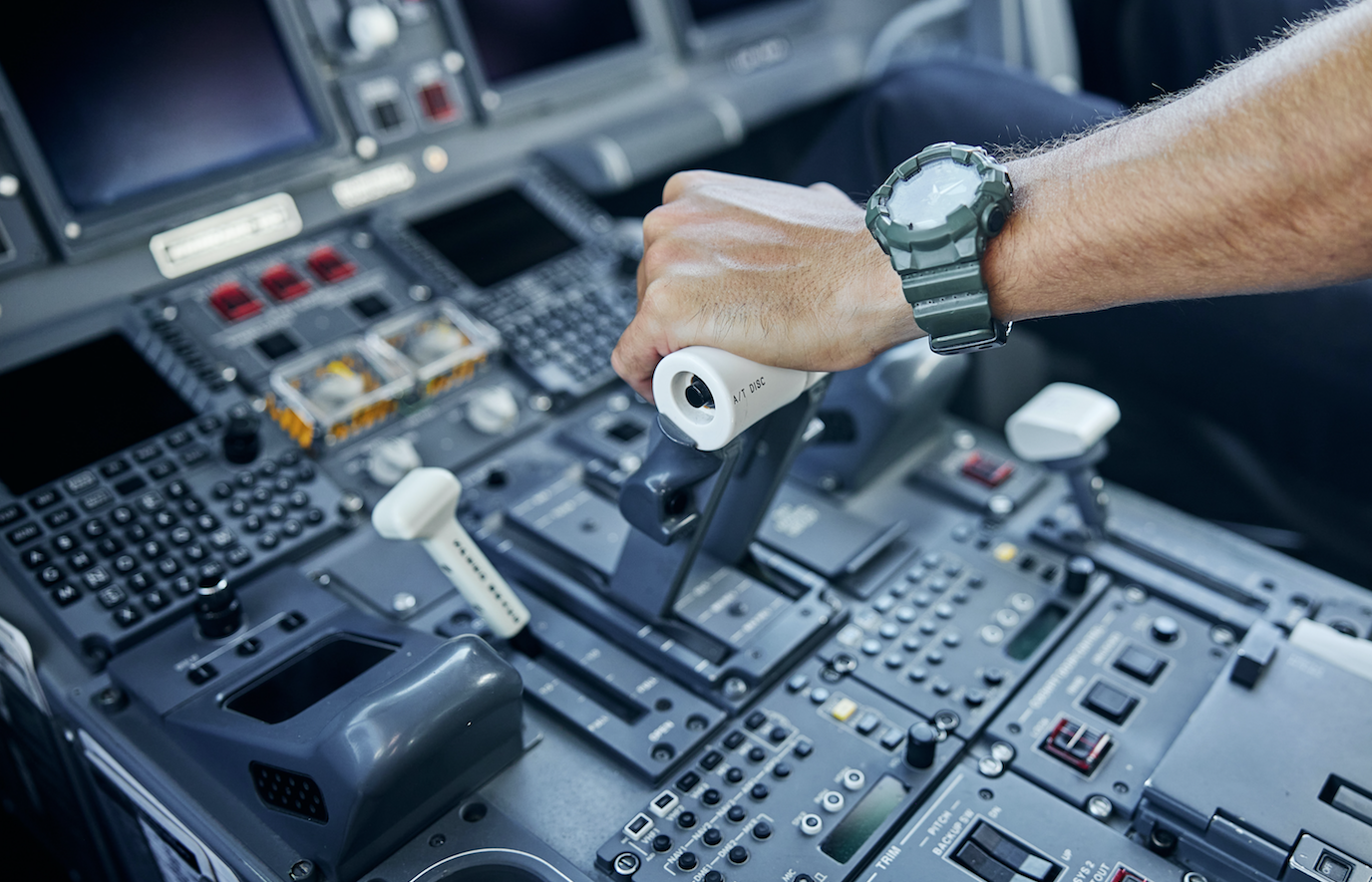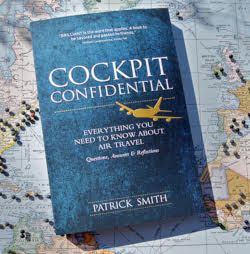Psyching Out

November 21, 2023
I SHOULD PROBABLY say something about the off-duty Alaska Airlines pilot who made headlines after attempting to shut down the engines of a Horizon Air regional jet en route to San Francisco. Joseph Emerson, 44, who was riding in the cockpit jumpseat, faces multiple counts of attempted murder.
Emerson says he believed he was in a dream-state at the time after dosing on psychedelic mushrooms two days earlier. He’d been traumatized by the death of a close friend, and, it has been reported, had been battling depression for years.
Where the drug use and mental health problems intersect is problematic. It’s tempting to see this as a clear-cut case of dangerously reckless behavior, backstory be damned. A heavy-enough intake of magic mushrooms can cause anybody, regardless of their normal mental state, to lose track of reality. So-called microdosing has become common as a do-it-yourself depression treatment; perhaps Emerson upped a dose without realizing how intense the effects can be. And as medical professionals will attest, depression by itself does not typically inspire sufferers to commit acts of violence. It took the mushrooms to push Captain Emerson over the edge.
(Twice in the last week I’ve been treated to snarky, “Hey man, I hope you aren’t trippin’!” comments from passengers. I know that flying brings out the worst and rudest in people, but try to restrain yourself.)
However you look at it, the incident has touched off a difficult conversation about how pilots do, or don’t, deal with ailments like depression and anxiety, the diagnosis of which can cost a pilot his or her livelihood. And we’re reminded, sadly, of Germanwings first officer Andreas Lubitz, who in 2015 locked the captain out of the cockpit and flew his Airbus A320 into the Alps, killing everybody on board. Not to mention first officer Gameel Al-Batouti, who in 1999 flew EgyptAir flight 990 into the Atlantic Ocean, murdering 217 people.
The New York Times ran an excellent story on the subject, here. There isn’t a whole lot I can add, other than to cut and paste from an earlier post…
First, be wary of extrapolation. The total number of pilot suicide crashes over the decades is a tiny one. These incidents are what they are: outliers. You can argue that the certification process for pilots needs fixing, but that’s not reason enough to suggest there’s a crisis at hand, with hundreds of looming Emerson’s or Lubitzes or Al-Batoutis waiting to snap, with nothing to prevent them from doing so.
And in only the rarest cases does mental illness turn people violent. The idea that a depressed individual is likely to be a dangerous individual is an ignorant and unfair presumption about the nature of mental illness. As one Ask the Pilot reader put it after the Germanwings catastrophe, “Andreas Lubitz didn’t kill those people because he was depressed; he killed them because he was evil.” You can say the same for Al-Batouti. In all but the rarest cases, a pilot with a mental health issue is not an unsafe pilot, never mind a suicidal killer.
Pilots are human beings, and no profession is bulletproof against every human weakness. Whether the result of stress or something more systemic, pilots sometimes need help — just as professionals in any industry do, including those entrusted with the lives of others. Unfortunately for us, the association carries a heavy stigma, and anything involving commercial aviation is subject to media amplification and hysteria.
The FAA now permits pilots to take certain anti-depressant medications. Although the process can be onerous, the agency says it will convene a committee to explore and update mental health protocols, aiming to speed up the approval process for those under treatment.
Airlines, meanwhile, have become more supportive and proactive than you might expect, while ALPA and other pilot unions have medical and mental health staff that pilots can contact any time. A proactive, employee-friendly approach keeps the problem from being driven underground; if a pilot has an issue, he or she can pick up the phone, usually with little worry of long-term career implications.
In the U.S., airline pilots undergo medical evaluations either yearly or twice-yearly, depending. A medical certificate must be issued by an FAA-certified physician. The checkup is not a psychological checkup per se, but the doctor evaluates a pilot on numerous criteria, up to and including his or her mental health. In addition, new-hire pilots at some airlines undergo psychological examinations prior to being hired. On top of that we all are subject to random testing for narcotics and alcohol.
We can further debate the merits of additional psychological testing, but at a certain point I’m not sure what more we should want or expect.
In the end, we’re forced to rely on a set of presumptions — it comes down to trust, if you will. As a pilot I do not come to work wondering if one of my colleagues is going to kill me. Passengers shouldn’t either. On the contrary. I don’t want this to sound like an airline commercial or an FAA press release, but you can confidently presume that the people flying your plane are exactly what you expect them to be: well-trained professionals for whom safety is their foremost priority.
Related Story:
Photo courtesy of Unsplash.





Leave a Comment
Maximum 1500 characters. Watch your spelling and grammar. Poorly written posts will be deleted!
12 Responses to “Psyching Out”
You are viewing newest comments first. Click to reverse order
Admiral Cloudberg covered this in depth in their article on the German Wings crash. https://admiralcloudberg.medium.com/the-madness-in-our-methods-the-crash-of-germanwings-flight-9525-and-our-broken-aeromedical-system-5b95abd4fe6d As usual for their stuff, highly recommend. Change is needed.
I know this is a bit off topic, but if Emerson had managed to cut off the fuel flow and shut down the engines, would the pilots been able to restart them and continue the flight? Assuming Emerson was ejected from the cockpit promptly of course. Is that something training would have covered?
In GA training, instructors are fond of closing the throttle and asking the student “where ya gonna land?” This seems like a different order of problem, given how complicated it is to start get engines.
Without further complications, it would’ve been fairly straightforward to restart the engines. They had plenty of time and altitude.
I’ve read several different places that shrooms pass out of your system within a few hours, definitely by 24 hours later. So it seems very likely that Emerson was no longer under the influence of the shrooms themselves.
I’ve also read that, in people with underlying mental illness, shrooms can trigger a psychotic break a day or two later — and a psychotic break seems to me to match the way Emerson described what he was experiencing.
It’s a very good thing that he had the presence of mind, once the pilots got him out of the flight deck, to go to a flight attendant and ask to be zip-tied.
So I wouldn’t be inclined to convict Emerson of attempted murder. Interfering with a flight crew and reckless endangerment, yes, but it seems clear that he had no intent to kill.
Also from what I read, he seems to have had an exemplary career before this. If that’s the case, obviously he shouldn’t, and almost certainly won’t, be allowed to fly again, but I hope that an airline could see fit to hire him for its training staff.
Mental illness is not the only condition that will get an employee kicked to the curb. Many years ago I was a salesman with a large computer company, well above quota, diagnosed with cancer.
After my treatment they did not fire me, but they stuck me in the hinterlands, where I still excelled. When the next economic downturn came, they closed the hinterlands offices.
A few years later I ran into my old boss at a trade show and he was truly shocked that I was still alive. This was 30 years ago.
I am a physician, a surgeon, not a psychiatrist. Pilots have mental illness just like everyone else. Depression is common and readily treatable in most people. It’s laughable that your heart surgeon might be profoundly depressed and on medication, but nobody will ever even check. He or she can practice without any disclosure to anybody. A pilot with an ATP has clearly proven him/herself over time and there is a huge amount invested in all that training. Commercial pilots need to be able to admit, address and be treated for mental health issues for the safety of all of us and for simple fairness. Unlike surgeons, commercial pilots in the cockpit have a second pilot there to help.
Safety and pilot lives will improve to the same degree that treatment options without fear of consequences improve even further. And consider: Many people with a mental illness of a certain seriousness will take a life without suffering of their illness any day over a career continuation. Take severe cases of depression for instance. This will upend one’s life for a significant time, to a point that simply choosing your shoes for the day, which route to drive to work or how to cope with one‘s bosses dissatisfaction because of your two days of sick leave will make for tremendous suffering and despair. My wife‘s career (not in aviation) ended like that.
Me, I had a mild episode of depression two years ago. I’m currently on maintenance medication, a light anti-depressant. Entering PPL(A) training, my class 2 med ended with a restriction that prevents me from taking on passengers, that is friends, even my wife. The drug that is allowed under FAA rules, is potentially allowed under EASA rules, if your EU home country decides so. Unfortunately, in Lubitz’ home country, guess whether there is enough political will to allow this… 🙁
Maybe we can add to the depressed list of Lubitz et al: Capt. Zaharie Ahmad Shah? I still hope that one day the wreck will be found… along with some answers.
As Kevin implies, there’s no lack of sputtering psychopaths out on the roads, but who worries about each potential death-bomb that zips past you going the other direction just a painted line away? And any nutjob can get a driver’s licence.
As with alcohol abuse, it clearly isn’t in the aviation industry’s interest to drive mental illness underground. The less punitive the approach, the more willing people will be to grasp a helping hand.
My wife has been schizophrenic for decades. The stigma, & fear, is completely unwarranted.
And I’ve been a Dodgers fan ever since I learned they’ve been giving Andrew Toles a no-pay contract for years now only so he can benefit from the team’s health insurance.
I don’t feel my safety is being threatened by pilots or that a pilot suffering from depression cannot safely fly their aircraft. I have no reason to treat people different just because they suffer from mental illness — I wouldn’t do that if it were somatic either.
But I do feel very strongly about regulation. As such I have to reject all claims about “microdosing” and “self-medication”. There is a difference between suffering from mental illness and being intoxicated. If this captain (on the jump seat) had been up there drunk trying to shut off the engines, the conversation would have been over long ago. So why change tone just because it happens to involve some fashionable substance like shrooms instead of liquor? Lots of people “self-medicate” with booze, that doesn’t make it right or a “treatment”.
Mental illness can be treated by a medical professional, and yes, can involve prescription substances. There is an entire process and QC around that, most importantly, the FAA has regulations that describe how such a process shall be carried out while maintaining safe air traffic. That is a completely different thing from somebody willy-nilly popping some substance as “do-it-yourself treatment”.
This pilot should face consequences not for being ill or requiring medication, but because he violated protocol in how as a pilot you deal with that. And if we have a problem with access to mental health care, then that needs to be remedied, not leeway given to popping shrooms etc.
The pilot can’t come out and say it, but let’s be clear that much of life amounts to risk management. More than you realize; more than you can possibly realize, perhaps?
Let’s put the whole Bayesian probability thing aside. For a few seconds.
Time’s up.
Patrick Smith, pilot, is also an internet influencer. That’ fine. Factor that in to your risk assesment?
Well said. It’s incredible how safe commercial flying is especially compared to years past. What we all should worry about is the safety on the road these days – Maybe im just getting old, but people sure seem to drive much more dangerously and aggressively than in years past. To compare to aviation, a jumbo jet with well over 200 passengers on board would have to crash every other day to equal deaths by auto in the US.